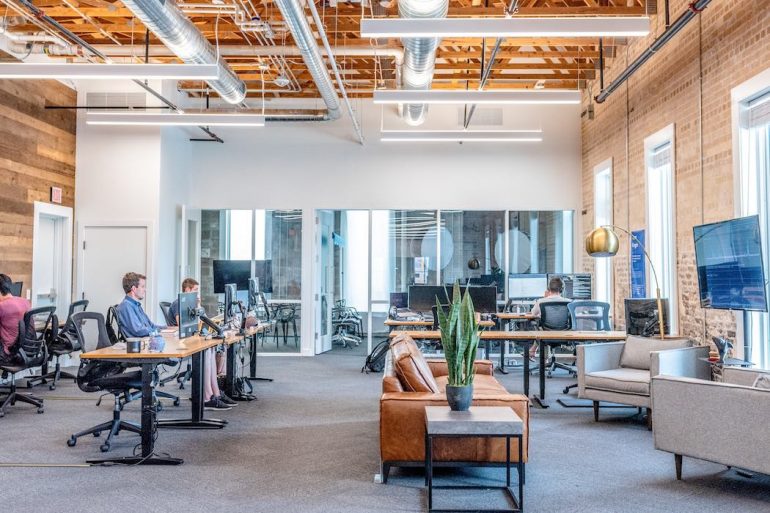Repopulating offices in the COVID-19 era has emerged as a key challenge for Canadian companies, particularly as the country faces the “second wave” of the pandemic. Preventing an outbreak in the workplace remains a top concern about reopening.
The goal behind the new feature is to ensure offices run safely as many parts of Canada enter the second wave of the COVID-19 pandemic.
In the era of COVID-19, preventing an office outbreak means ensuring coworkers practice physical distancing when possible. One Toronto-based software consulting firm is launching a new product aimed to tackle this challenge.
Jonah Group, which develops custom digital solutions, has launched HIVE AI Insight, a new occupancy monitoring feature that counts the number of occupants in a designated area.
The solution counts the number of people in an area anonymously with an artificial intelligence-based algorithm that runs on local hardware and webcams. The occupancy counts are shared with users and administrators, allowing them to see the occupancy level of shared spaces.
HIVE AI Insight is part of the broader HIVE platform, a B2B application launched in July. HIVE was developed in response to Jonah Group’s clients’ requirements for a platform that could guide offices through different stages of COVID-19 transformation, ranging from return-to-office and social distancing to desk hotelling and data analytics.
According to a survey conducted by Get Working, 50 percent of Canadian business leaders say they cannot guarantee employees a safe return to work. Companies looking to safely return their employees to the office are working to create new policies around contact tracing, sanitization, social distancing, and occupancy monitoring.
RELATED: Tehama raises $14 million CAD as it looks to address demand for remote working solutions
Allan Wong, Jonah Group’s vice president of sales, said the goal behind HIVE was to create an automated solution that manages these tasks and eases the burden on human resources teams. Live AI’s monitoring also adds data to the repository of information already captured by HIVE, to inform future operational decisions for businesses.
In addition to occupancy monitoring, the HIVE platform also has a desk hoteling feature that allows businesses to measure which employee wants a desk, which department they belong to, and how often they come in. Glenn Archer, founder of Jonah Group, said this data could help businesses with the planning for subletting or office space renewals.
Archer told BetaKit the HIVE platform was born out of Jonah Group’s own in-house needs. The company began planning a strategy to come back to the office and realized all the “unknowns” of a safe return to work.
In the summer, large companies like Shopify began announcing a shift to remote work that would continue even after the COVID-19 pandemic ends. Archer said this longer-term shift around managing people and mobility is what formed at the basis of the HIVE offering.
“A lot of companies that we’re talking to are taking [a safe return to work] really seriously,” Archer added. “As things move along, companies have to evaluate the risk for staff and employees.”
The HIVE platform represents the first time Jonah Group has built and promoted its own software. As a consulting firm, the company usually builds solutions for clients, and the clients own the intellectual property.
RELATED: Futurist Amy Webb explains why COVID-19 is forcing businesses to ask new questions about data, trust
“We’re like the shoemaker’s kids. We tend not to think about building things for ourselves, we just build for other people,” added Wong. “So it was actually a revelation to us … that this is something that we could actually market because it really fits into clients’ needs.”
Several organizations are already using the HIVE platform. Although the clients were kept anonymous, Archer said Jonah Group is targeting customers across a wide spectrum, including finance companies, call centre operations, and large retailers.
The pandemic has undoubtedly been a catalyst for new technologies and digital solutions to help individuals, businesses, and governments adapt to the new reality. Companies like BlackBerry and Shopify have worked on the federal government’s contact tracing app, which is currently rolling out nationwide.
But with new data-based technology comes new concerns around how that data is used. A report released this month by Canada’s privacy commissioner warned that new technologies that have seen mass adoption during the COVID-19 pandemic raise new privacy concerns, and underscore the need to reform privacy legislation.
When asked how HIVE AI Insight is ensuring privacy protection for employees, Archer told BetaKit the company made a conscious choice to not collect certain data. The app does not store location data, nor does it store health data, Archer said, noting the video streams that track room occupancy never leaves the computer. The only data tracked is the number of people in the room.
“The information gathered in the app is the information that is volunteered by the users consciously,” Archer said. “We don’t collect anything that users are not aware of.”
“Every step of the way we’re really trying to minimize how much we’re data we’re capturing about an individual,” he added.
Image source Unsplash. Photo by Austin Distel.

